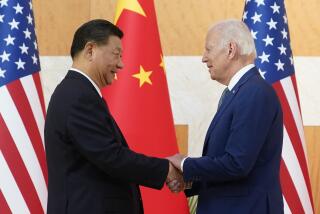Tarnished gold
- Share via
Juan Antonio Samaranch, the former head of the International Olympic Committee who helped engineer Beijing’s successful bid to host this summer’s Games, was quick to dub the extravaganza “the best Olympics ever” as the proceedings closed on Sunday. Such pronouncements are as subjective as a gymnastics score, but it’s beyond question that China can say it has hosted the most expensive Olympics ever and, quite possibly, the most rigidly controlled.
Historians might debate the latter point. Adolf Hitler’s 1936 Berlin Games were just as much an international propaganda campaign as the 2008 event, carefully choreographed to demonstrate the glory of the Third Reich. But even Hitler couldn’t control the weather. Chinese leaders, terrified that Beijing’s lung-blackening air pollution would cast a pall over the city’s image as well as its skies, directed the Weather Modification Office (yes, there really is such an agency) to seed clouds throughout the Games so that rainfall could flush away the filth. Yet rain wouldn’t do during the opening and closing ceremonies at the open-air Bird’s Nest stadium, so hundreds of rockets were fired into the clouds to chase them away.
In the end, China got precisely what it paid more than $41 billion for. It won far more gold medals than any other nation, persuaded world leaders to attend the Games despite their misgivings about Beijing’s horrific human rights record both domestically and abroad, and announced with a clamor as loud as the 2,008 drummers who performed at the opening ceremony that it is a rising power that should command respect.
Yet what planners in Beijing miscalculated is that no matter how well you teach performers to smile, the strain behind the lips is still detectable. The near-hysterical drive by Chinese leaders to put on the biggest, most spectacular sporting event ever, and to engineer a generation of Chinese medalists regardless of the financial or human costs, is rather more disconcerting to the outside world than convincing. If it was Beijing’s intention to prove China’s greatness via the Games, what it has demonstrated instead is the fragility of its ego.
British officials are no doubt wondering how they can possibly top the spectacle of Beijing when London hosts the Summer Games in 2012. They shouldn’t even try. The British have nothing to prove, and it will be refreshing to watch an event in which athleticism matters more than image. The London Olympics will probably be messier and less awe-inspiring than the Chinese Games, but it’s a good bet they’ll be more fun.
More to Read
Go beyond the scoreboard
Get the latest on L.A.'s teams in the daily Sports Report newsletter.
You may occasionally receive promotional content from the Los Angeles Times.






